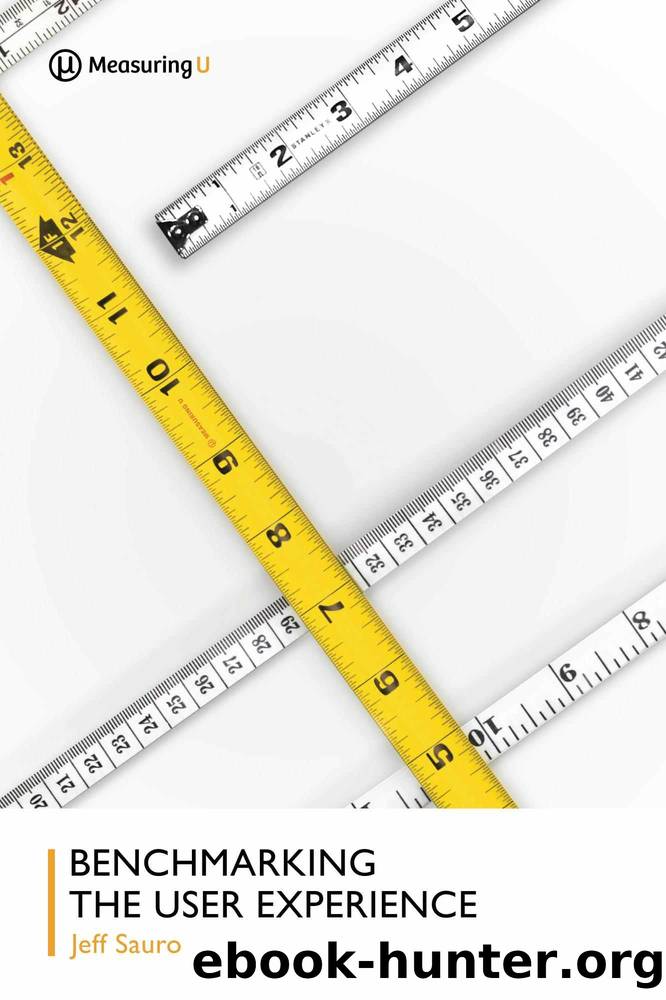Benchmarking the User Experience by Jeff Sauro

Author:Jeff Sauro
Language: eng
Format: mobi
Published: 2018-08-14T16:00:00+00:00
Be sure you have a survey quota. Some surveys can fill fast, and you donât want to be on the hook for 2,000 payments if you only budgeted for 1,000.
If you have to oversample (because of rejecting poor-quality responses), you will likely have to decide whether to compensate all or just the responses you thought were worth retaining.
If youâre running a lottery, youâll again want to consider the costs of obtaining the incentive and shipping costs if applicable. And if youâre using discount codes, be sure thatâs factored into your actual sales margin.
10. Money or gifts can present more legal issues.
Not everyone can receive money or gifts. Physicians, radiologists, and government employees are among the many participant types who are often not allowed to receive money at all. Also, some industries are not permitted to give money or gifts. For example, there are rules against pharmaceutical companies paying doctors, even nominal gifts, due to the potential conflict of interest.
11. Appeal to the interest of your participants.
If the participants feel like their voice will make a difference, you may not need any incentive. This is especially the case if your survey is generally short (think under 10 minutes). For example, if a customer feels like their opinion will help improve a product or service they use, theyâre more likely to participate in your benchmark study. Or if you have a passionate group of users, (e.g., non-profits), they will likely provide their opinions at much higher rates.
12. Money may also hurt response rates.
Not only does compensating hit the bottom line, in some cases, it may negatively affect your response rate. It may seem like offering an incentive is a no-brainer way to get more people to participate. But money is not just like any other type of incentive; people treat it differently.
If your participants are already intrinsically motivated to provide their feedback (e.g., because they believe in your cause or product), offering money can backfire. Thereâs less research on this effect in survey incentives, but itâs a well-documented effect in many other contexts.
13. Donât coerce.
While itâs generally less of a concern for benchmarking studies, there is often a concern about incentives being coercive, especially for certain disadvantaged populations. In the event you are surveying an economically disadvantaged group, be sure your incentive isnât coercing people to feel they need to respond in order to get a service, for example.
Download
This site does not store any files on its server. We only index and link to content provided by other sites. Please contact the content providers to delete copyright contents if any and email us, we'll remove relevant links or contents immediately.
Kotlin in Action by Dmitry Jemerov(18632)
Grails in Action by Glen Smith Peter Ledbrook(16314)
Sass and Compass in Action by Wynn Netherland Nathan Weizenbaum Chris Eppstein Brandon Mathis(13940)
Configuring Windows Server Hybrid Advanced Services Exam Ref AZ-801 by Chris Gill(7510)
Azure Containers Explained by Wesley Haakman & Richard Hooper(7509)
Running Windows Containers on AWS by Marcio Morales(7059)
Microsoft 365 Identity and Services Exam Guide MS-100 by Aaron Guilmette(5444)
Microsoft Cybersecurity Architect Exam Ref SC-100 by Dwayne Natwick(5284)
Combating Crime on the Dark Web by Nearchos Nearchou(5030)
The Ruby Workshop by Akshat Paul Peter Philips Dániel Szabó and Cheyne Wallace(4711)
Management Strategies for the Cloud Revolution: How Cloud Computing Is Transforming Business and Why You Can't Afford to Be Left Behind by Charles Babcock(4558)
Python for Security and Networking - Third Edition by José Manuel Ortega(4284)
The Age of Surveillance Capitalism by Shoshana Zuboff(4267)
Learn Wireshark by Lisa Bock(4183)
Learn Windows PowerShell in a Month of Lunches by Don Jones(4147)
Ember.js in Action by Joachim Haagen Skeie(3949)
The Ultimate Docker Container Book by Schenker Gabriel N.;(3931)
DevSecOps in Practice with VMware Tanzu by Parth Pandit & Robert Hardt(3618)
Windows Ransomware Detection and Protection by Marius Sandbu(3588)
